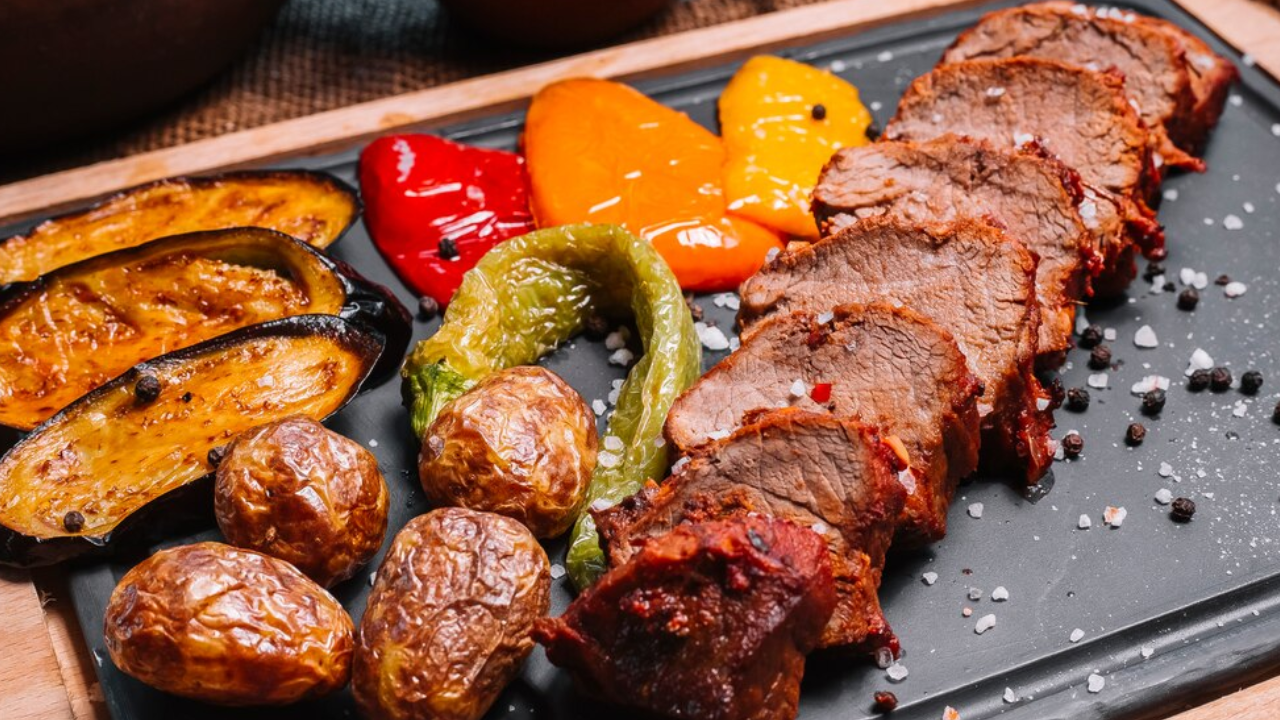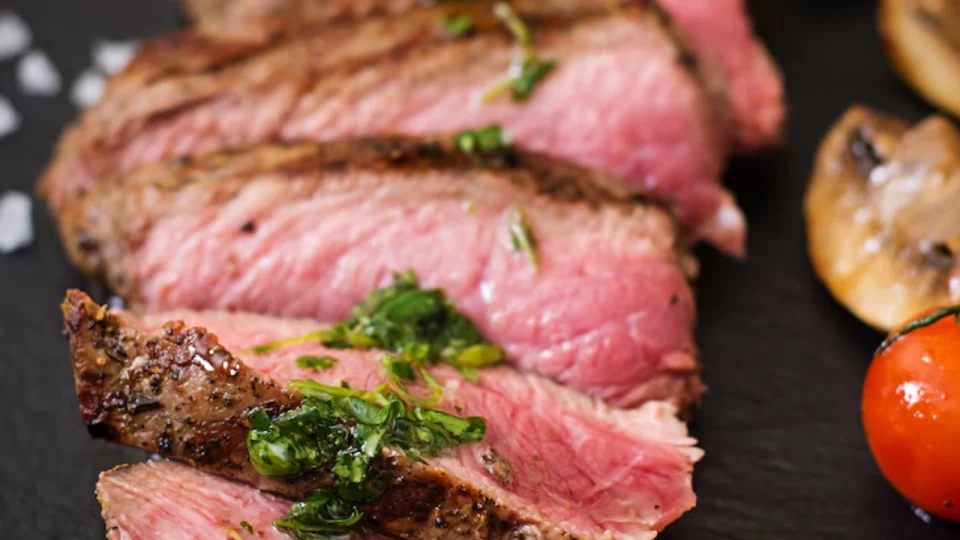Roast beef is a beloved dish worldwide, cherished for its rich flavor, versatility, and satisfying texture. However, as health consciousness grows, many wonder about the health benefits and potential risks associated with consuming roast beef regularly.
Understanding the nutritional profile of roast beef, its health effects, and considerations for specific diets can help you make informed choices about incorporating it into your meals.
Table of Contents
1. The Nutritional Profile of Roast Beef
Roast beef is a protein powerhouse, providing essential nutrients that support bodily functions, muscle health, and overall vitality. Here’s an overview of the nutritional content found in a typical serving of roast beef:
- Calories: A 3-ounce serving of roast beef contains approximately 140-160 calories, depending on the cut and cooking method. While it’s not overly caloric, portion control is essential.
- Protein: Roast beef is high in protein, with a 3-ounce serving delivering about 22-24 grams. Protein is crucial for muscle repair, immune function, and energy levels.
- Fat: The fat content of roast beef varies depending on the cut. Lean cuts like eye of round roast have about 4-6 grams of fat per serving, while fattier cuts, such as ribeye roast, can have up to 10-15 grams. Approximately half of this fat is monounsaturated, with some saturated fats.
- Iron: Roast beef is a rich source of heme iron, which is highly bioavailable and supports oxygen transport, energy production, and cognitive function. A 3-ounce serving offers around 10% of the daily recommended intake.
- B Vitamins: It contains B vitamins, particularly B12, which aids in nerve function, DNA synthesis, and red blood cell formation. A serving of roast beef provides around 35-45% of the daily B12 recommendation.
- Zinc: Essential for immune health, zinc is abundant in roast beef, with a 3-ounce portion providing about 25% of the daily recommended intake.
Benefits of Roast Beef’s Nutritional Composition
The nutrient profile of roast beef is impressive, making it a highly nutritious addition to many diets. It offers key vitamins and minerals needed for energy, immune support, and brain function. Additionally, protein from beef can help with muscle growth, repair, and satiety, which is why roast beef is often favored by athletes, those looking to maintain or build muscle, and individuals with high physical demands.
2. Health Benefits of Roast Beef
Due to its nutrient density, roast beef offers several potential health benefits when consumed in moderation. Here’s a breakdown of the primary health advantages:
Muscle Development and Repair
Roast beef is particularly popular in diets aimed at supporting muscle growth and repair. Protein is essential for these functions, and the high-quality, complete proteins in roast beef contain all nine essential amino acids. Additionally, its B12 content plays a role in energy production, aiding in post-exercise recovery.
Immune System Support
The zinc and iron in roast beef are vital for immune health. Zinc helps produce white blood cells that fight infections, while iron supports oxygen transportation to tissues, fueling the immune system and reducing fatigue. The presence of these minerals makes roast beef beneficial for those prone to anemia or who require immune support.
Heart Health and Blood Pressure Management
While some cuts of roast beef contain significant amounts of fat, choosing lean cuts may offer heart health benefits. Lean beef, when consumed in moderation, can contribute to heart health by providing essential minerals and vitamins without excessive saturated fats. Furthermore, roast beef is a natural source of potassium, which helps regulate blood pressure and counterbalances sodium intake.
Weight Management and Satiety
For individuals focused on weight management, the protein in roast beef can promote satiety and help curb hunger. Studies show that high-protein meals can reduce appetite, leading to lower caloric intake throughout the day. This makes roast beef a valuable component in balanced diets aimed at maintaining a healthy weight.
3. Potential Health Risks of Eating Roast Beef
While roast beef offers many benefits, certain risks should be considered, especially with frequent or large portions.
High Saturated Fat and Cholesterol
Certain cuts of roast beef are high in saturated fats, which, in excess, can contribute to elevated cholesterol levels and increase the risk of heart disease. Although research shows that moderate saturated fat intake is acceptable for most individuals, those with preexisting heart conditions or high cholesterol levels should limit their intake or opt for leaner cuts.
Sodium Content
If you’re purchasing pre-packaged or deli-style roast beef, sodium levels can be surprisingly high. Processed roast beef is often cured or seasoned with salt to enhance flavor and preservation, which can contribute to hypertension or other cardiovascular issues when consumed frequently. Reading labels and choosing low-sodium varieties can mitigate these effects.
Potential Carcinogens from Cooking Processes
When red meat, including beef, is cooked at high temperatures (such as roasting or grilling), compounds known as heterocyclic amines (HCAs) and polycyclic aromatic hydrocarbons (PAHs) can form. These compounds have been linked to increased cancer risk in some studies, particularly colorectal cancer. To reduce these risks, consider slower cooking methods at lower temperatures, marinating the beef, or limiting the consumption of charred or well-done pieces.
Risk of Foodborne Illness
Beef should be cooked to safe internal temperatures (145°F or 63°C for medium-rare, 160°F or 71°C for medium) to reduce the risk of foodborne illnesses, such as E. coli and salmonella. Leftover roast beef should be stored and reheated properly to avoid bacterial growth, particularly if it has been left at room temperature for too long.
4. Roast Beef in Special Diets

Certain diets may include or exclude roast beef, so it’s essential to know how it fits into various popular dietary frameworks:
Keto and Low-Carb Diets
Roast beef is naturally low in carbohydrates, making it an ideal protein source for ketogenic or low-carb diets. High-fat cuts can also fit within the high-fat requirements of the keto diet, though leaner cuts may be better suited for low-carb, high-protein variations.
Paleo and Whole30 Diets
Since roast beef is a whole, minimally processed food, it can be included in both Paleo and Whole30 diets as long as it’s free from artificial additives or preservatives. Home-cooked roast beef is usually more compatible with these diets than pre-packaged deli options.
Mediterranean Diet
The Mediterranean diet emphasizes lean meats, including poultry and fish, over red meat. While roast beef is not a primary staple, it can be included occasionally. Opting for lean cuts and incorporating ample vegetables and olive oil can create a balanced, Mediterranean-inspired meal with roast beef.
Vegan and Vegetarian Diets
Roast beef is, of course, not compatible with vegan or vegetarian diets. However, there are plant-based alternatives designed to mimic roast beef’s texture and flavor. While these substitutes lack the same nutritional profile, they can provide protein and iron from plant-based sources.
5. Tips for Making Healthier Roast Beef
If you want to enjoy roast beef while minimizing potential health risks, consider these preparation and selection tips:
- Choose Lean Cuts: Opt for cuts like round or sirloin tip, which contain less fat. These cuts still provide ample protein and iron without as much saturated fat.
- Trim Visible Fat: Removing excess fat before cooking reduces saturated fat content without sacrificing flavor.
- Opt for Low-Sodium Seasonings: Season roast beef with herbs, garlic, and spices rather than salt-heavy rubs or marinades to control sodium intake.
- Avoid Overcooking: Cooking at moderate temperatures helps prevent the formation of potentially harmful compounds, such as HCAs and PAHs.
- Pair with Vegetables: Balance the plate by pairing roast beef with fiber-rich vegetables, which support digestion and may reduce the impact of heme iron on the digestive tract.
- Watch Portion Sizes: Limit portions to 3-4 ounces per meal to avoid overconsumption of red meat, keeping it within a balanced diet.
